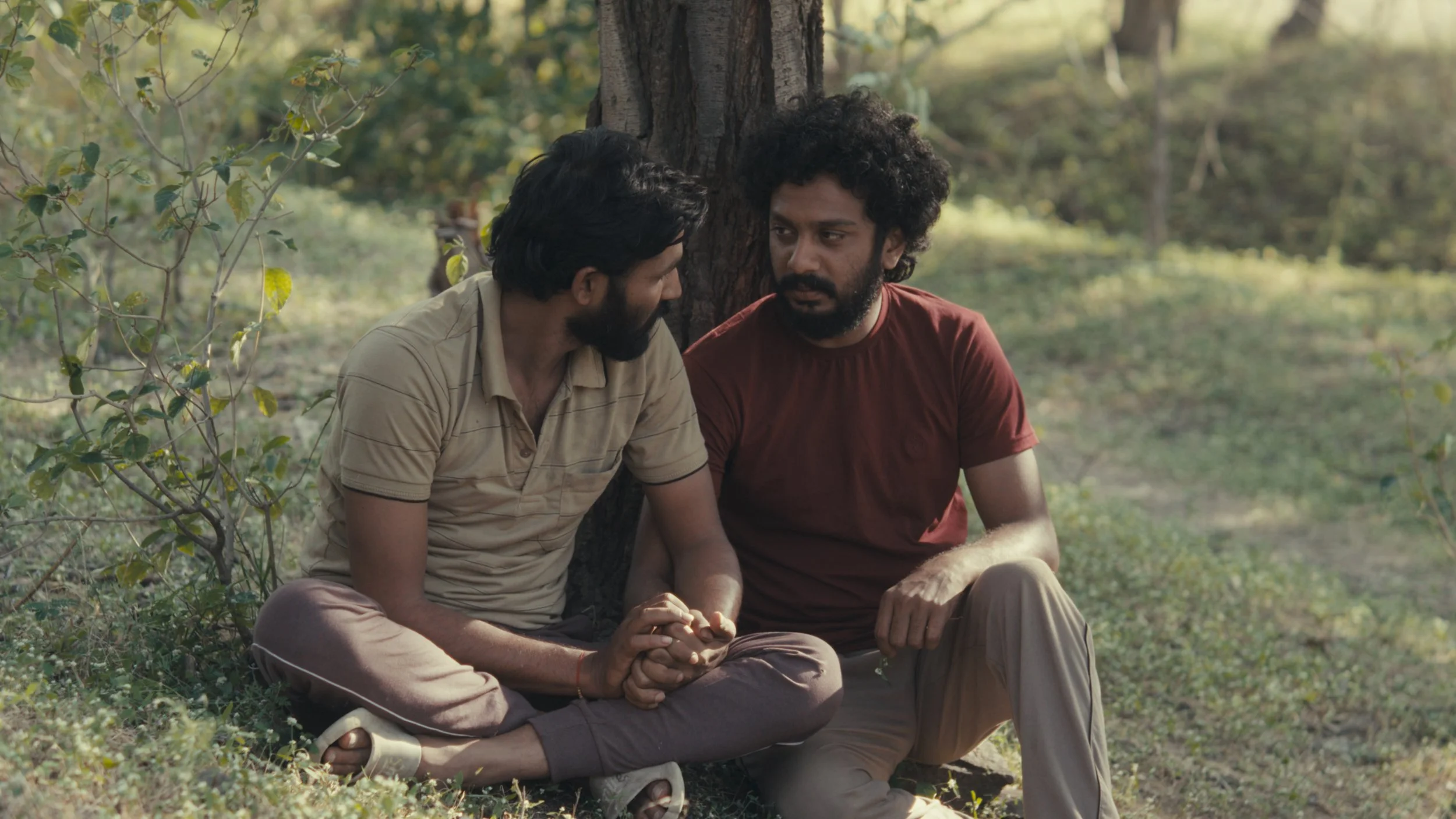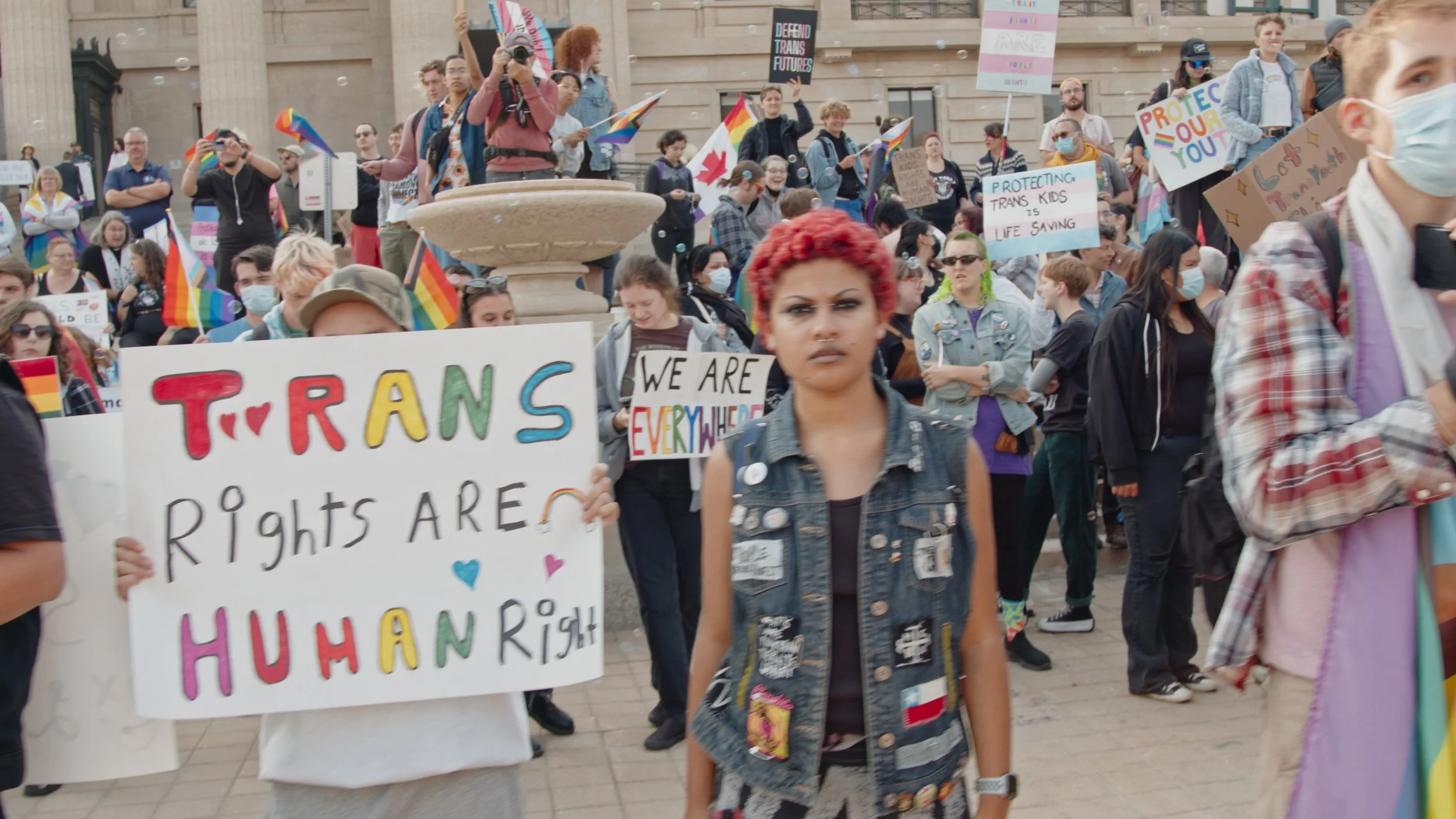Inside Out Film and Video Festival Turns 35 with Tales of Transformation
By Liam Lacey
“Music was in the air in Toronto in September 1991, where the reputation of queer film and video started to build up,” wrote B. Ruby Rich in her landmark Sight and Sound essay in which she coined the term, New Queer Cinema.
Rich was writing about programming at the Toronto Festival of Festivals, though the build-up was well under way by the time of Toronto’s first Inside Out festival launched in March of that year.
Now back for its 35th year, the Inside Out Film and Video Festival is an annual event that has tracked the evolution of a cinema that reflects the varied lives of 2SLGBTQ+ (two-spirited, lesbian gay, bisexual, queer or questioning) people.
Cactus Pears
Opening Gala: The festival’s May 23 opening gala is Outerlands, the debut feature from director Elena Oxman. It follows a non-binary restaurant worker, nanny and party drug dealer, Cass (Asia Kate Dylan, Billions, Orange is the New Black), living in a rundown west-side San Francisco neighbourhood.
After Cass spends the night with her work crush, Kalli (Louisa Krause), her new lover calls to ask Cass to temporarily take care of her 11-year-old daughter, Ari. When Kalli fails to return, the experience awakens Cass’s own childhood experiences of abandonment.
According to Variety: “Outerlands frames San Francisco as a transient space, never fully allowing Cass to feel at ease. This sense of impermanence informs even the movie’s most understated drama, usually revolving around Cass trying to connect with Ari while also tracking her mother down.”
RE:Focus Gala (May 24) Zackary Drucker’s documentary, Enigma. Drucker’s exploration of trans history presents a double portrait of Amanda Lear and April Ashley. Ashley, the British model and actress, was outed as a trans-woman by the press in 1961, and later earned an MBE for her work for trans equality.
Lear, the French muse to Salvador Dalí, model, disco star and David Bowie ex, has always denied she was gender assigned male at birth, though Ashley, and others, insist they knew her before her transition.
According to Mey Rude in Out magazine: “Normally, an interviewer asking Lear about her history, gender, and sex is a painful experience that makes you cringe. When Drucker is asking, however, those same questions come across as lovely and respectful, like reaching across the aisle to sincerely (and hopefully) make a connection.”
Centrepiece Gala (May 27): The winner of Sundance’s World Cinema Dramatic Competition, Rohan Kanawade’s Cactus Pears (Sabafr Bonda) is a drama about a Mumbai call centre employee who returns to his rural hometown following the death of his father and reconnects romantically with his childhood friend, Balya.
Screen Daily’s Wendy Ide wrote: "Cactus Pears is a subdued, sensitive study of bereavement and the quietly radical act of being queer in a rural, lower-class Indian community."
Closing Gala (May 31): The Best Friend (O Melhor Amigo) by Allan Deberton has been described in the Brazilian press as a jukebox musical, like Mamma Mia, which includes previous hit songs with nostalgic appeal framed around a new story about a young architect Lucas (Vinícius Teixeira) who travels to the resort beach, where he runs into Felipe (Gabriel Fuentes), a love from his past, works as a tourist guide.
Canadian Film:
Sweet Angel Baby
Though Inside Out announcements make no reference to the “Elbows Up” national cultural moment, there is a sizeable quotient of Canadian content in this year’s program. That includes two dedicated shorts programs, the Toronto-based Shorts: Local Heroes (May 29, 7 pm, TIFF Lightbox, Cinema 1) and the Canada-wide, Shorts: Stories We Tell (May 31, 2 pm, TIFF Lightbox, Cinema 2).
There are also the following seven feature films:
Starwalker (Fri, May 23, 6:45 pm, TIFF Lightbox, Cinema 2). Adapted from Corey Payette’s Vancouver stage musical, Starwalker tells the story of two-spirit Indigenous street hustler, Eddie Starwalker, who, while out cruising one night, meets Levi (Jeffrey Michael Follis). Levi introduces him to a fictional East Vancouver drag performance theatre called the House of Borealis, ruled by Mother Borealis (Stewart Adam McKensy).
There he learns the basics of drag, finds a surrogate family and his “Star” persona. The script is thin, but from choreography, costumes, music and performances, Starwalker pops, and the blend of Indigenous music and drag cabaret feels unforced and fresh.
Unlabelled (Sun, May 25, 3:45 pm, TIFF Lightbox, Cinema 2.
Director Colette Johnson-Vosberg brought her upbeat feature, Unusually Normal about “Canada’s gayest family” (consisting of three generations of lesbian women), to Inside Out last year. This year, she has returned with Unlabelled, a documentary about three trans people in Toronto. Emery, Lucah and Lucy, all went through intense experiences of fear and confusion in their youth. They have now have succeeded in matching their outer selves to their gender identities and found love and companionship along the way.
Lucah is a filmmaker (he co-directed the Peabody nominated, Jackie Shane: Any Other Way) and a transgender man. Lucy, also a filmmaker, identifies as a transgender woman. Emery, who is binary, does burlesque performance art, and scenes from his act appear through the film. Unlabelled unfolds like a sensible and sensitive primer on the transgender experience and you could imagine screening for a health class in a liberal high school.
Lakeview (Sun, May 25, 4 pm, TIFF Lightbox, Cinema 3). A group of people gather by the lake for a celebratory weekend, alcohol is drunk and truths spill out.
Sound familiar? Yes, and not quite. The sophomore feature from former Nova Scotia CBC arts reporter Tara Thorne (Compusus) tracks the tensions and bonds between a group of women who have arrived at a lakeside house to celebrate the divorce of their host, Darcy (Lesley Smith).
The ensemble includes soundalike couple, Julien (Kathryn McCormack) and Julie Anne (Stephanie Clarke), who are having a baby. Then there’s Lauren (Nicole Steeves) who has brought along her new much younger empathic girlfriend, Phoebe (Faly Mevemanana) and the emotionally messy Lucy (Jessica Marie Brown) who arrives already drunk.
But the big event is the imminent arrival of Dax, a semi-famous singer-songwriter and sex magnet, played by Nova Scotia singer-songwriter Hilary Adams. Though Dax can seduce at will, she has a vulnerable side, revealed in a couple of musical numbers in the film’s second half. Though more entertaining when the women are flinging barbs than revealing emotions, the film stands as a showcase for Nova Scotia acting talent.
Two Women (Deux Femmes) Sun. May 25, 6:45 pm, TIFF Lightbox, Cinema 2
If you’ve ever wondered what a feminist update on a 55-year-old sex comedy would play, here’s your chance. Director Chloé Robichaud (Sarah Prefers to Run) reworks Claude Fournier’s 1970 Quebec hit Deux Femmes en or (Two Women in Gold). It’s about a pair of stay-at-home spouses who, bored with their husbands, start seducing random delivery men.
The script, by Catherine Léger, is based on her adaptation of the material into a stage play, which follows unemployed translator, Florence (Karine Gonthier-Hyndman) and home-bound new mother, Violette (Laurence Leboeuf) who are neighbours in a cramped Montreal co-op.
After the two women bond over confessions of their unsatisfying sex lives, they begin to pick out tradesmen and other strangers to have sex with. The film was shot in 35mm with smartly symmetrical compositions, the actors are committed, and the script has some mordantly funny lines (i.e.: “Our relationship works best when one of us is on antidepressants”). But whether it offers any fresh insights into the lives of contemporary women is up for debate.
Parade: Queer Acts of Love and Resistance
Parade: Queer Acts of Love and Resistance: (May 30, 11:45 am, TIFF Lightbox, Cinema 1).
Director Noam Gonick’s survey of the 2SLGBTQl+ civil rights movement in Canada, was the opening night film for this year’s Hot Docs festival. And it will get a national roll-out beginning during Pride Month, with theatrical and streaming outlets, including screenings on CBC and TV Ontario, and from June 27, on the National Film Board platform.
Gonick’s history begins in 1967, with then Justice Minister Pierre Trudeau’s famous quote about the state having no place in the bedrooms of the nation. Says Tim McCaskell — one of the founders of the pioneering gay journal The Body Politic — Trudeau’s criminal code reform “dramatically changed the conversation” around same-sex relationships.
Gonick’s film hops about chronologically, mixing black-and-white and colour, contemporary interviews, and archival footage, with sections focusing on lesbian, Indigenous, Asian, Black, and Latin activism, and segments devoted to legislative wins, the repercussions of the police raids, and the devastation of the AIDS epidemic.
Because the film casts such a wide net, it is easy to find omissions or quibble with degrees of emphasis, but it serves a valuable purpose by getting so many of the pioneering activists on screen.
Really Happy Someday (Tues, May 27, 6:45, TIFF Lightbox, Cinema 2) Something of a documentary-drama hybrid, director J Stevens’ Really Happy Someday stars Breton Lalama as Z, a trans masculine musical theatre actor who, in the opening scene, botches an audition for Les Misérables when his voice cracks. The cause: vocal changes, due to the testosterone injections he has recently been taking.
The film was shot over months as Lalama was actually transitioning, and we watch and hear his physical and vocal changes as Z studies with a vocal coach, changes romantic partners, and claws his way back musically. There’s an unexpected echo of Eminen’s hip-hop musical, 8 Mile here (and not just from Z’s short-cropped hair and tank tops). It’s a parable about fighting through life struggles to find musical authenticity.
Sweet Angel Baby (Sat. May 31, 4:30 pm, TIFF Lightbox, Cinema 2). Michaela Kurimsky, who made a splash with her performance in the 2018 teen drama, Firecrackers, stars as Eliza, a single woman living a triple life in a Newfoundland fishing town in director Melanie Oates’ sophomore feature.
Eliza is close to her family, works in a bakery, fundraises for the local church and helps her neighbours. But at night she sneaks over to hook up with her lesbian co-worker, Toni (Elle-Máijá Tailfeathers). And unknown to everyone, likes to go into the woods and take masked erotic photos of herself for an anonymous social media account where she has thousands of followers.
Eliza’s even open to some affection from a local married man (Peter Mooney) which leads to exposure of her secret life, turning the film’s second half into a version of The Scarlet Letter for the social media age. The title suggests that Eliza is childlike and the film’s impact depends on Kurimsky’s ability to convey the character’s unusual combination of guilelessness and erotic need.





